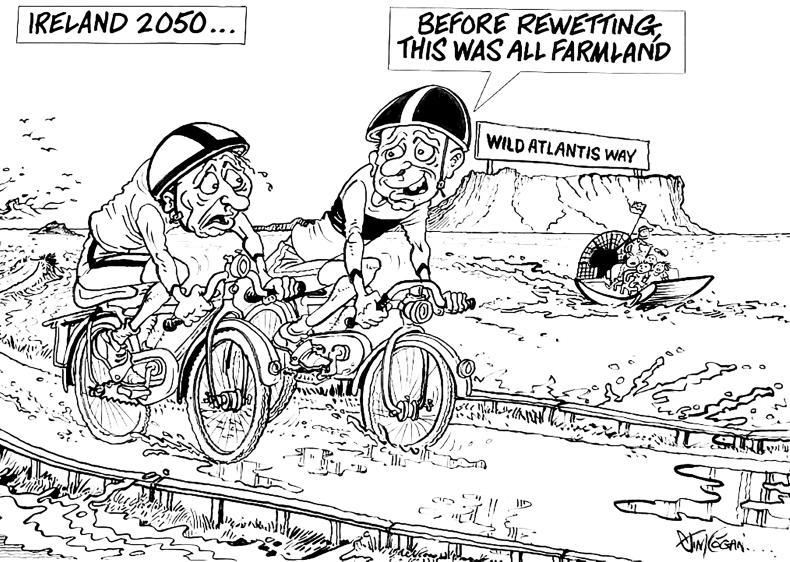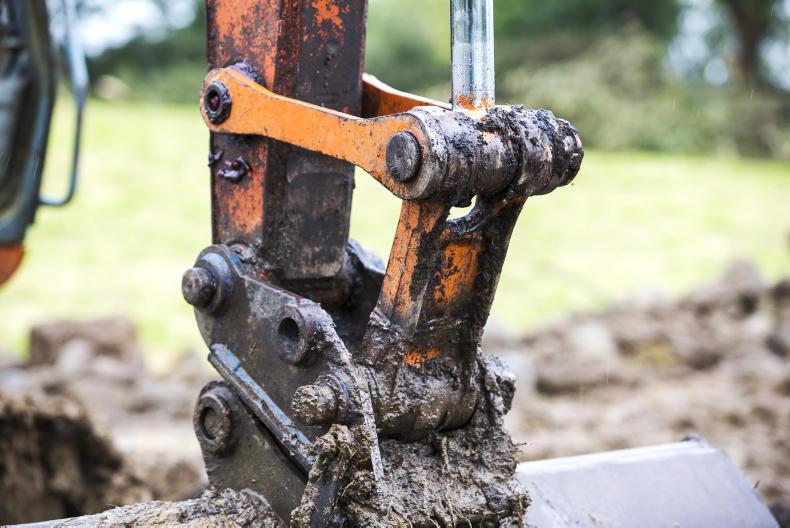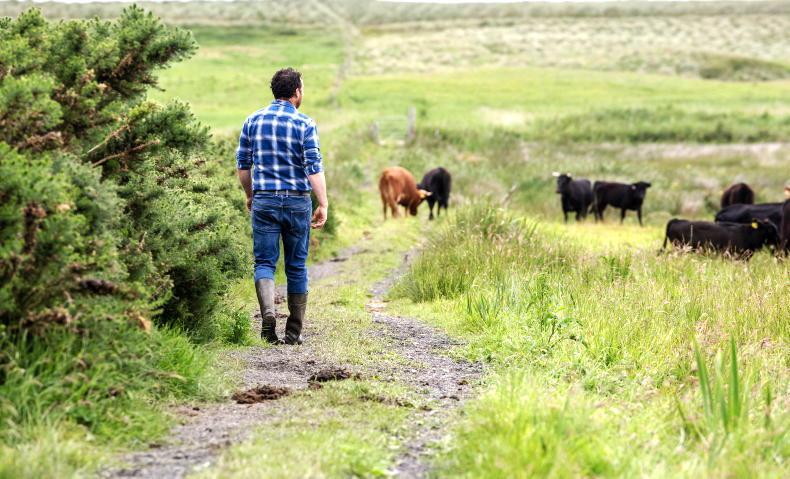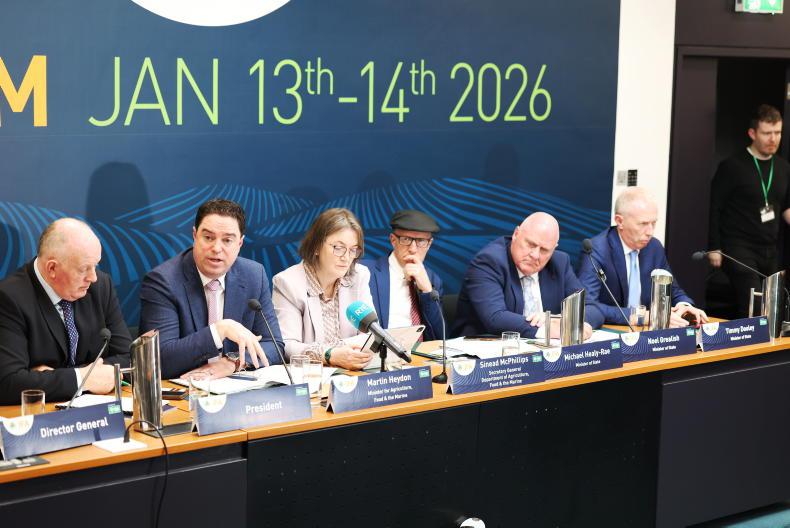Most farmers are fully supportive of “nature restoration”. However, when you call the proposed new legislation ‘rewetting’ and it covers a good chunk of the midlands and west, it becomes a whole different ballgame.
To carry out the actions in the proposed nature restoration regulations would take a leap of faith that most Irish farmers would struggle to carry out, even if they were compensated to do so. The fact there is no budget for this is the first significant problem.
The midlands and western peatlands are only one part of this nature legislation and ultimately it will affect all Irish farms, because the butterflies don’t just live on peatlands. Farmers on mineral soils and those with designated habitats for butterflies and birds also come under this legislation.
The long and short of this is even if farmers don’t see the merit or reward in this new legislation, they might have no choice.
A voluntary aspect is not on the table. Once enacted by the EU it becomes national law in all member states, enforceable through the national courts. It also provides timelines for change unlike other legislation. So even if there is some initial voluntary element at member state farm level, it’s not hard to envisage a situation where it would become legally binding.
Threat
Either way, the threat of losing a BISS payment takes non-compliance off the table for most.
Last week tensions flared in the European Parliament when amendments that propose even more lands should be rewet, up by 33%, were lodged. The amendments to be voted on by the European Parliament’s environmental committee next month would see 45,000ha of Ireland’s drained farmed peatlands rewet by 2030, 100,000ha by 2040 and 140,000ha by 2050.
Fear of the unknown
So what is there to worry about? Fear of the unknown is leading to a lot of anxiety. A fear of undoing 100 years of hard work. A fear of not being able to stem the tide when the water encroaches. An inability to visualise or know what rewetting looks like. A lack of clarity around what drained peatland is? All of these unknowns lead some to believe this is another attack on farmer livelihoods.
The communication on this has been deplorable. It’s no wonder farmers are angry and reluctant. It’s probably also fair to say a lot of farmers are as yet unaware about the legislation making its way through Brussels.
The uproar by MEPs last week and comments from President Emmanuel Macron this week bring a new slant on proceedings.
Macron’s key comment from Paris this week was: “We have already passed lots of environmental regulations at European level, more than other countries. Now we should be implementing them, not making new changes in the rules or we are going to lose all our players.”

One of the issues that Macron’s comments touch off is that key existing legislation such as the water framework directive and the planned sustainable use of pesticides directive will support the delivery of nature restoration targets also. All of these are already pushing farmland to more extensive food production.
The science is unclear and emerging. In February we learned the emissions from drained peatland could be overstated by as much as 40%. While accepting emissions are only one part of this legislation, and that a butterfly index, a bird index and soil organic matter stocks are other measures, the very fact that Irish farmers don’t have numbers on any of these measures doesn’t help with acceptance.
Comments from Minister of State Malcolm Noonan at the IFA gathering in Tullamore stating that restoration does not mean rewetting to surface level in all cases does little to appease farmers. That nobody knows exactly how much land will be involved, how much of this will be State-owned land, what this proposed rewetting looks like, and indeed what the environmental benefits actually are does little to ease any fear.
Negatives
However, farmers are very clear on the production negatives.
The fact that it is unclear who or what Department owns this regulation doesn’t help. When there is a fuzziness about ownership, it is more difficult to engage and talk to landowners and farm organisations. The bottom line is that it is appallingly late for farmers to be hearing about such fundamental legislation and vast change in advance of a June vote by the environment committee and a July vote by European Parliament.
Blindsiding farmers is not the best route to successful legislation. Irish and European politicians know this, so it is incumbent on farmers to inform local representatives now on this challenge.
Read more
Glaring lack of clarity with planned 2024 EU nature law
Farmer rewetting fears to the fore in Offaly
Opinion: we need to see what rewetting looks like
Most farmers are fully supportive of “nature restoration”. However, when you call the proposed new legislation ‘rewetting’ and it covers a good chunk of the midlands and west, it becomes a whole different ballgame.
To carry out the actions in the proposed nature restoration regulations would take a leap of faith that most Irish farmers would struggle to carry out, even if they were compensated to do so. The fact there is no budget for this is the first significant problem.
The midlands and western peatlands are only one part of this nature legislation and ultimately it will affect all Irish farms, because the butterflies don’t just live on peatlands. Farmers on mineral soils and those with designated habitats for butterflies and birds also come under this legislation.
The long and short of this is even if farmers don’t see the merit or reward in this new legislation, they might have no choice.
A voluntary aspect is not on the table. Once enacted by the EU it becomes national law in all member states, enforceable through the national courts. It also provides timelines for change unlike other legislation. So even if there is some initial voluntary element at member state farm level, it’s not hard to envisage a situation where it would become legally binding.
Threat
Either way, the threat of losing a BISS payment takes non-compliance off the table for most.
Last week tensions flared in the European Parliament when amendments that propose even more lands should be rewet, up by 33%, were lodged. The amendments to be voted on by the European Parliament’s environmental committee next month would see 45,000ha of Ireland’s drained farmed peatlands rewet by 2030, 100,000ha by 2040 and 140,000ha by 2050.
Fear of the unknown
So what is there to worry about? Fear of the unknown is leading to a lot of anxiety. A fear of undoing 100 years of hard work. A fear of not being able to stem the tide when the water encroaches. An inability to visualise or know what rewetting looks like. A lack of clarity around what drained peatland is? All of these unknowns lead some to believe this is another attack on farmer livelihoods.
The communication on this has been deplorable. It’s no wonder farmers are angry and reluctant. It’s probably also fair to say a lot of farmers are as yet unaware about the legislation making its way through Brussels.
The uproar by MEPs last week and comments from President Emmanuel Macron this week bring a new slant on proceedings.
Macron’s key comment from Paris this week was: “We have already passed lots of environmental regulations at European level, more than other countries. Now we should be implementing them, not making new changes in the rules or we are going to lose all our players.”

One of the issues that Macron’s comments touch off is that key existing legislation such as the water framework directive and the planned sustainable use of pesticides directive will support the delivery of nature restoration targets also. All of these are already pushing farmland to more extensive food production.
The science is unclear and emerging. In February we learned the emissions from drained peatland could be overstated by as much as 40%. While accepting emissions are only one part of this legislation, and that a butterfly index, a bird index and soil organic matter stocks are other measures, the very fact that Irish farmers don’t have numbers on any of these measures doesn’t help with acceptance.
Comments from Minister of State Malcolm Noonan at the IFA gathering in Tullamore stating that restoration does not mean rewetting to surface level in all cases does little to appease farmers. That nobody knows exactly how much land will be involved, how much of this will be State-owned land, what this proposed rewetting looks like, and indeed what the environmental benefits actually are does little to ease any fear.
Negatives
However, farmers are very clear on the production negatives.
The fact that it is unclear who or what Department owns this regulation doesn’t help. When there is a fuzziness about ownership, it is more difficult to engage and talk to landowners and farm organisations. The bottom line is that it is appallingly late for farmers to be hearing about such fundamental legislation and vast change in advance of a June vote by the environment committee and a July vote by European Parliament.
Blindsiding farmers is not the best route to successful legislation. Irish and European politicians know this, so it is incumbent on farmers to inform local representatives now on this challenge.
Read more
Glaring lack of clarity with planned 2024 EU nature law
Farmer rewetting fears to the fore in Offaly
Opinion: we need to see what rewetting looks like











SHARING OPTIONS